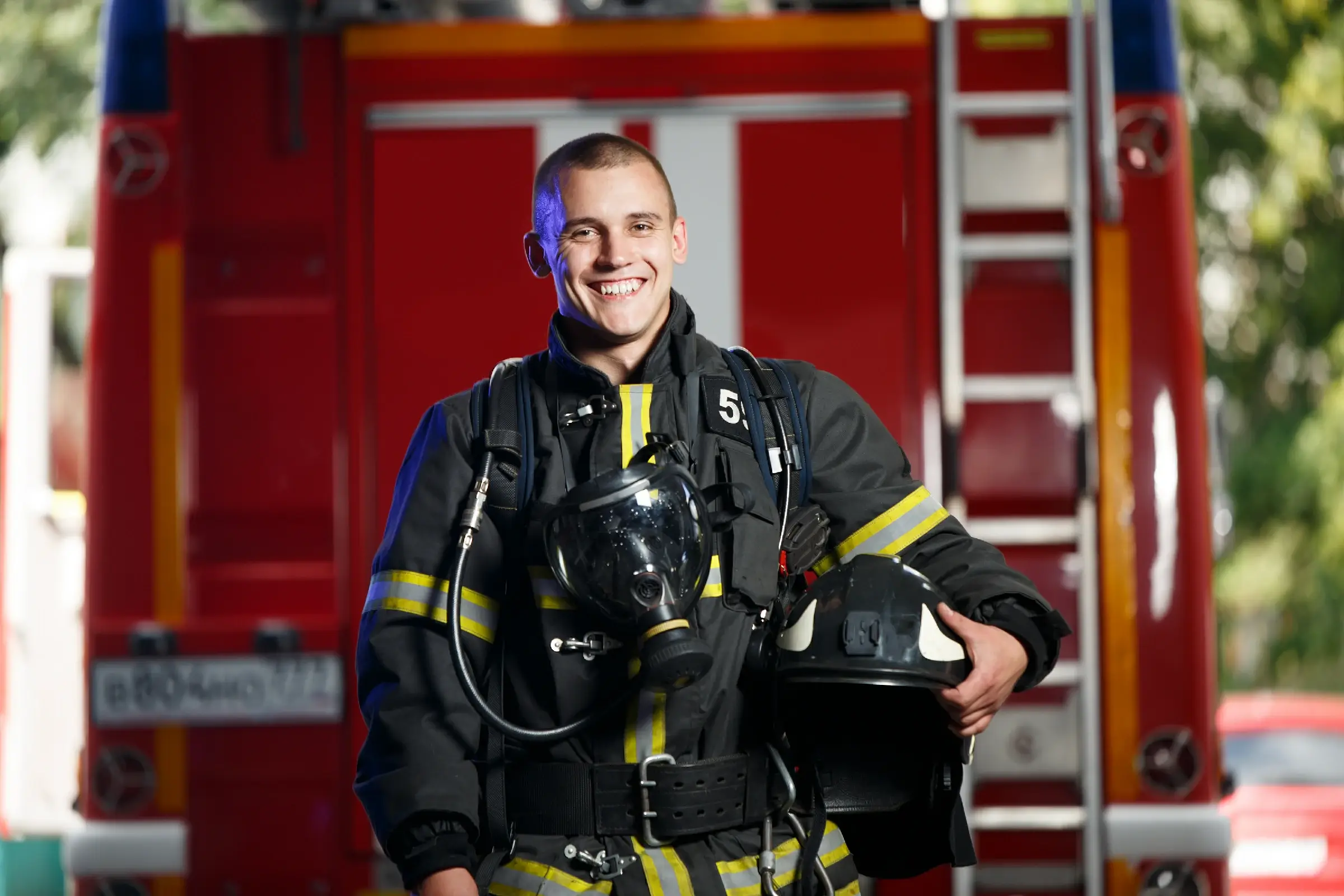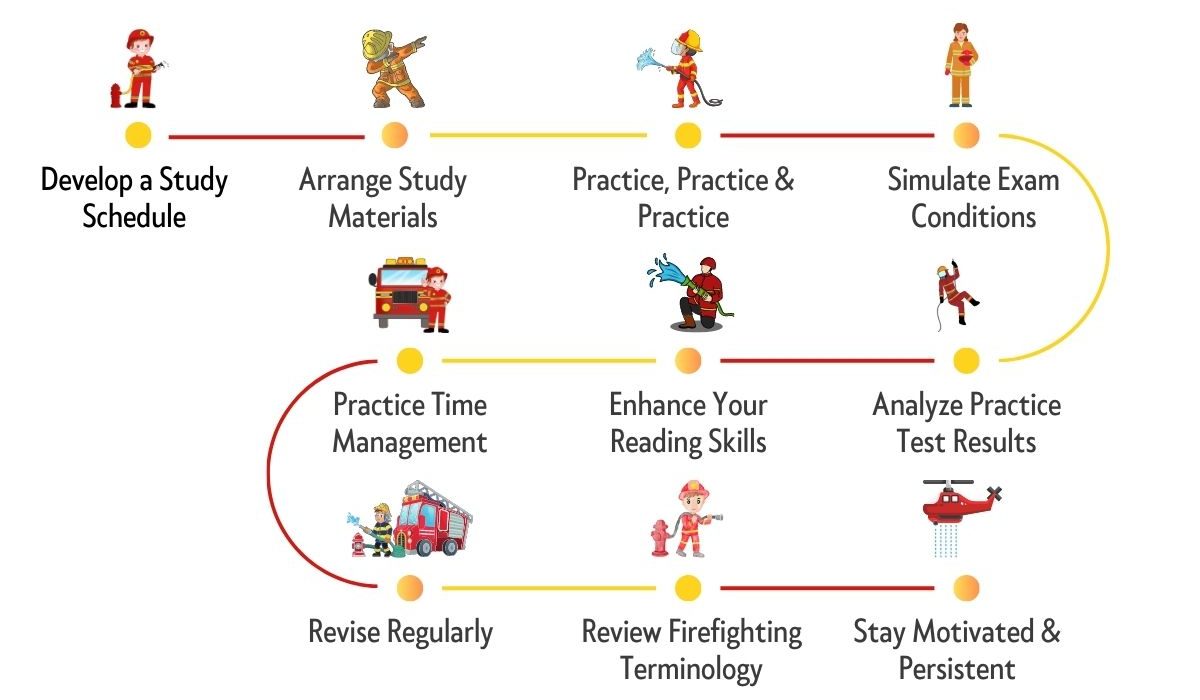NFSI QuickPass: Pass the NFSI Test on Your First Try - Expert Prep + Free Practice Test
- Practice Test
- Sample Question
- FAQs
- Reviews
The National Firefighter Selection Inventory (NFSI) is where many firefighter dreams are tested—and ended. With 155 questions in 2.5 hours, it challenges not just math, reasoning, and verbal skills, but also speed, accuracy, and personality-based questions that can feel like traps. Each year, strong candidates fail simply because they’re unprepared for the exam’s pace and pressure.
NFSI QuickPass is built to change that. With timed drills, firefighter-focused practice, and full-length mock exams that mirror the real test, you’ll train under true exam conditions. You’ll master pacing, spot patterns quickly, and handle behavioral questions with confidence—so on test day, you walk in prepared, not blindsided.
Take our free NFSI practice test and discover your starting score today.
Free NFSI Practice Test
Test your firefighter readiness with 8 challenging questions across all cognitive domains in just 8 minutes.
What is the NFSI Test?
The National Firefighter Selection Inventory (NFSI), developed by I/O Solutions, is the exam fire departments across the U.S. use to screen applicants. It doesn’t test firefighting techniques—it measures the abilities and traits that predict success in the fire service.
For candidates, it’s the first major gatekeeper: most departments set a passing score around 70–75%. Meet the mark, and you move forward; fall short, and your application ends there. That’s why smart preparation isn’t optional—it’s essential.
Format of the NFSI Test
The NFSI is a two-part exam designed to give departments a full picture of each candidate. It combines a traditional skills test with a personality-based assessment:
- Cognitive Ability: Questions that measure reading comprehension, reasoning, math skills, and problem-solving. These are job-related scenarios that test how well you process information and make decisions.
- Behavioral Orientation: A personality inventory that looks at traits like teamwork, motivation, and stress tolerance—qualities that determine if you’re a good fit for the fire service.
The exam has 155 questions and takes about 2.5 hours to complete. Both sections are equally important: departments seek candidates who can think quickly, stay calm under pressure, and work well in a team.
Sections of the NFSI Test
The NFSI looks beyond firefighting knowledge—it measures how you think, react, and work under pressure. Here’s what it focuses on:
Cognitive Ability
This portion evaluates how well you process, understand, and apply information under pressure. You’ll be assessed on your ability to:
Verbal Comprehension
Verbal comprehension involves understanding written passages, identifying main ideas, and comprehending the context. You will develop strategies to improve your reading comprehension skills and effectively interpret firefighting-related texts.
You will be given with a written passage that relates to firefighting procedures and scenarios. Then based on that passage you need to answer fire safety protocols related questions that test your understanding of the passage.
Passage: Fire safety in residential buildings is of utmost importance. Residential fires can cause significant damage and endanger lives. It is crucial for residents to be aware of preventive measures, such as having working smoke detectors, practicing fire escape plans, and maintaining fire-safe environments within their homes.
-
A:
The importance of fire safety in residential buildings
-
B:
Firefighting techniques for high-rise buildings
-
C:
Common causes of residential fires
-
D:
Strategies for preventing kitchen fires
Explanation:
The passage discusses the significance of fire safety specifically in residential buildings, emphasizing the need for preventive measures and preparedness.
Verbal Expression
Verbal expression focuses on your ability to communicate thoughts and ideas clearly and coherently. You will learn techniques to enhance your verbal communication skills, allowing you to convey information effectively during firefighting operations.
Please choose the appropriate word or phrase to complete the sentence.
-
A:
spread
-
B:
spreading
-
C:
been spreading
-
D:
spreaded
-
E:
spreads
Explanation:
In this sentence, we can see that the firefighters were called to the scene and, upon their arrival, discovered the fire's condition in relation to the neighboring buildings.
The correct option is (A) "spread" because it is the simple past tense of the verb "spread." The sentence requires the past tense because the event of the fire spreading happened before the firefighters arrived.
Problem Sensitivity
Problem sensitivity is the skill of recognizing and identifying problems quickly and accurately. In the context of firefighting, it involves assessing emergency situations, identifying potential hazards, and determining appropriate actions to mitigate risks.
You will be given different scenarios and asked to identify potential problems or hazards in them. After a through analysis and critical thinking, you will recognize risks, assess the severity of situation(s), and determine appropriate action.
Upon arrival at the scene, a firefighter observes smoke billowing out of a ground-floor apartment in a multi-story building. There are reports of people still inside the building.
-
A:
Ensuring the safety of occupants
-
B:
Controlling the spread of the fire
-
C:
Activating the alarm system
-
D:
Assessing the structural integrity of the building
Explanation: The immediate concern in any firefighting scenario is the safety of the people involved. Firefighters must prioritize evacuating occupants and ensuring their well-being.
Deductive Reasoning
Deductive reasoning involves drawing logical conclusions based on general rules or premises. You will practice applying deductive reasoning to analyze firefighting scenarios, identify patterns, and make accurate deductions.
Passage: Firefighters are equipped with specialized gear to protect themselves while fighting fires. They undergo rigorous training to handle various emergency situations, including fire suppression, rescue operations, and emergency medical procedures. Their training emphasizes the importance of personal protective equipment (PPE) to ensure their safety.
-
A:
Firefighters should always wear protective gear.
-
B:
Firefighters can extinguish fires without using water.
-
C:
Firefighters are trained in emergency medical procedures.
-
D:
Firefighters primarily use firefighting foam for fire suppression.
Explanation: The given information implies that firefighters are exposed to hazardous conditions, indicating the need for wearing protective gear to ensure their safety.
Inductive Reasoning
Inductive reasoning involves making generalized predictions based on specific instances or observations. You will need to draw logical conclusions from provided information and apply it to broader firefighting contexts.
Passage: On a foggy evening, a city bus loses control while navigating a sharp turn and collides with a parked pickup truck. Three bystanders immediately call 911, and local police, emergency medical services, and fire rescue are dispatched to the scene.
Upon arrival, firefighters assess the situation. They observe the scene, the involved vehicles, and the condition of the bus driver. The driver is clutching his chest, appears to be short of breath, and is unable to stand without assistance. Meanwhile, a passenger in the rear of the bus is unconscious with a noticeable bump and small laceration on her head.
Firefighters suspect the bus driver is suffering from a heart attack. Meanwhile, the unconscious passenger may have sustained a head injury due to the collision. They act swiftly to remove her from the bus while also keeping her neck stable to prevent potential spinal injuries.
After the passenger is safely moved and stabilized, she is transported to a local trauma center for further evaluation and treatment. The bus driver also receives immediate attention and is rushed to the hospital for suspected cardiac issues.
-
A:
They applied a tourniquet to stop any bleeding.
-
B:
They kept her neck stable to prevent potential spinal injuries.
-
C:
They provided oxygen to help with her breathing.
-
D:
They placed her in a sitting position to prevent shock.
Explanation: The passage clearly states that the firefighters took precaution to keep the unconscious passenger's neck stable while removing her from the bus. This is done to prevent potential spinal injuries that could arise from rough or improper handling of a person who has sustained a head injury. Therefore, the correct answer is (b) They kept her neck stable to prevent potential spinal injuries.
Information Ordering
Information ordering refers to the ability to organize and arrange information in a logical and coherent manner. In firefighting, this skill is crucial for effective decision-making and prioritizing actions during emergency response situations.
You might be given a list of actions required to control a fire, and you will need to arrange them in the correct order of execution based on their importance and sequence.
1. Assess the structure for potential hazards.
2. Communicate the situation to the incident commander.
3. Conduct a primary search for occupants.
4. Coordinate with team members to establish search patterns.
-
A:
1, 2, 3, 4
-
B:
2, 1, 4, 3
-
C:
4, 3, 1, 2
-
D:
3, 4, 2, 1
Explanation: In a search and rescue operation, the correct sequence is to first coordinate with team members to establish search patterns, then conduct a primary search for occupants, assess the structure for potential hazards, and finally communicate the situation to the incident commander.
Mathematical Reasoning and Numeric Facilitation
Mathematical reasoning involves the application of mathematical concepts and problem-solving skills to firefighting scenarios.
Numeric facilitation on the other hand is about performing calculations, measurements, and data analysis relevant to firefighting operations. You will enhance your numerical problem-solving skills and learn to apply mathematical reasoning to solve firefighting-related challenges.
-
A:
150 liters
-
B:
200 liters
-
C:
250 liters
-
D:
300 liters
Explanation:
To calculate the amount of water delivered in 30 seconds, divide the given flow rate (400 liters per minute) by 2 (to convert it to 30 seconds). Thus, 400/2 = 200 liters per 30 seconds. Therefore, the fire hose can deliver 200 liters of water in 30 seconds.
Non- Cognitive Skills (Behavioral Orientation)
Beyond problem-solving, fire departments need candidates who can thrive in high-stress, team-driven environments. This section explores traits like:
Stress Tolerance
Stress tolerance refers to the ability to remain calm and focused under pressure and in high-stress situations. As a firefighter, you will encounter intense and demanding circumstances, and it is essential to develop resilience and effective coping mechanisms.
You are expected to know effective stress management techniques and strategies for maintaining composure so that you can make sound decisions even in high-pressure environments.
In the behavioral section, there are no “right” or “wrong” answers. This section is designed to measure individual responses and attitudes rather than having a definitive correct or incorrect outcome.
-
A:
Strongly agree
-
B:
Agree
-
C:
Not sure
-
D:
Disagree
-
E:
Strongly disagree
Explanation:
Strongly Disagree: Indicates you feel unable to prioritize or allocate resources effectively under stress, showing low confidence or experience in emergencies.
Disagree: Suggests some doubt in your ability to manage resources in emergencies; you may have basic skills but need more practice or training.
Neutral: Shows uncertainty or limited experience with prioritizing and allocating resources under pressure.
Agree: Reflects confidence in your ability to handle emergencies effectively, while recognizing potential for improvement.
Strongly Agree: Demonstrates strong confidence and experience in managing resources and priorities during high-stress situations.
Team Orientation
Team orientation focuses on developing strong teamwork skills, which are vital for collaborating seamlessly with fellow firefighters and emergency response teams.
As a firefighter. You are expected to posses effective communication and interpersonal skills. You should know how to work collaboratively in a team environment and understand the importance of coordination and cooperation to achieve successful outcomes.
-
A:
Strongly agree
-
B:
Agree
-
C:
Not sure
-
D:
Disagree
-
E:
Strongly disagree
Explanation:
Strongly Disagree: Indicates strong opposition to fostering a supportive, cooperative team environment, favoring a competitive or individualistic approach that may hinder team cohesion.
Disagree: Shows some disagreement or doubt about the importance or feasibility of a supportive team environment, though not complete opposition.
Neutral: Reflects no strong stance; your view on team cooperation depends on context or situation.
Agree: Suggests general support for teamwork and positive relationships, valuing cooperation and team initiatives.
Strongly Agree: Demonstrates a strong belief in and commitment to building a positive, cooperative, and supportive team dynamic, actively promoting teamwork and camaraderie.
Motivation & Attitude
Motivation and attitude play a significant role in the firefighting profession. You will explore the importance of intrinsic motivation and develop a positive attitude towards the challenges and responsibilities of being a firefighter.
You will cultivate a strong work ethic, embrace the dedication and commitment required for the profession, and maintain a growth mindset, constantly seeking opportunities for self-improvement.
-
A:
Strongly agree
-
B:
Agree
-
C:
Not sure
-
D:
Disagree
-
E:
Strongly disagree
Explanation:
Strongly Disagree: Shows little to no motivation to help others during crises; your interests likely lie outside crisis response or assistance roles.
Disagree: Suggests limited motivation to assist others in emergencies, with only some interest in making a positive impact.
Neutral: Reflects a moderate or situational willingness to help; motivation may vary depending on circumstances.
Agree: Indicates genuine motivation to help others and make a positive impact during crises, influencing your actions and decisions.
Strongly Agree: Demonstrates a strong, consistent drive to assist others in emergencies, showing deep commitment to helping and aligning well with crisis response roles.

NFSI QuickPass
Last Updated: Oct 24, 2025
Course Content
-
 Introduction 1 StepBuy this Course: Get full access to all lessons, practice tests and guides.
Introduction 1 StepBuy this Course: Get full access to all lessons, practice tests and guides. -
 Verbal Comprehension 3 StepsBuy this Course: Get full access to all lessons, practice tests and guides.
Verbal Comprehension 3 StepsBuy this Course: Get full access to all lessons, practice tests and guides. -
 Verbal Expression 2 StepsBuy this Course: Get full access to all lessons, practice tests and guides.
Verbal Expression 2 StepsBuy this Course: Get full access to all lessons, practice tests and guides. -
 Problem Sensitivity 2 StepsBuy this Course: Get full access to all lessons, practice tests and guides.
Problem Sensitivity 2 StepsBuy this Course: Get full access to all lessons, practice tests and guides. -
 Deductive Reasoning 2 StepsBuy this Course: Get full access to all lessons, practice tests and guides.
Deductive Reasoning 2 StepsBuy this Course: Get full access to all lessons, practice tests and guides. -
 Inductive Reasoning 2 StepsBuy this Course: Get full access to all lessons, practice tests and guides.
Inductive Reasoning 2 StepsBuy this Course: Get full access to all lessons, practice tests and guides. -
 Information Ordering 2 StepsBuy this Course: Get full access to all lessons, practice tests and guides.
Information Ordering 2 StepsBuy this Course: Get full access to all lessons, practice tests and guides. -
 Mathematical Reasoning & Numeric Facilitation 3 StepsBuy this Course: Get full access to all lessons, practice tests and guides.
Mathematical Reasoning & Numeric Facilitation 3 StepsBuy this Course: Get full access to all lessons, practice tests and guides. -
 NFSI Non-Cognitive Section 1 StepBuy this Course: Get full access to all lessons, practice tests and guides.
NFSI Non-Cognitive Section 1 StepBuy this Course: Get full access to all lessons, practice tests and guides. -
 Stress Tolerance 1 StepBuy this Course: Get full access to all lessons, practice tests and guides.
Stress Tolerance 1 StepBuy this Course: Get full access to all lessons, practice tests and guides. -
 Team Orientation 1 StepBuy this Course: Get full access to all lessons, practice tests and guides.
Team Orientation 1 StepBuy this Course: Get full access to all lessons, practice tests and guides. -
 Motivation & Attitude 1 StepBuy this Course: Get full access to all lessons, practice tests and guides.
Motivation & Attitude 1 StepBuy this Course: Get full access to all lessons, practice tests and guides. -
 Non-Cognitive Practice Quizzes 3 StepsBuy this Course: Get full access to all lessons, practice tests and guides.
Non-Cognitive Practice Quizzes 3 StepsBuy this Course: Get full access to all lessons, practice tests and guides.
Why Choose NFSI QuickPass Prep?
NFSI QuickPass is designed to empower you with the skills and knowledge needed to excel in the exam. Here’s why we stand out:

Comprehensive NFSI Study Guides: Master all essential skills with detailed lessons covering every section of the NFSI test, ensuring you’re fully prepared for every aspect.

Extensive Practice Questions: Enhance your critical thinking and problem-solving abilities with a wide range of meticulously designed practice questions, including unique passages and scenarios.

Realistic Practice Test: Sharpen your strengths and improve weak areas with focused quizzes for each topic, allowing you to track your progress and refine your approach.

Expert Tips & Strategies: Maximize your chances of excelling with valuable insights—from time management techniques to effective study habits—tailored to the NFSI test.

Flexible Learning Options: Study anytime, anywhere with mobile-friendly materials and personalized study plans that fit your schedule.
With expert guidance, practical tools, and proven strategies, our course is your key to excelling on the NFSI test and advancing your firefighter career!
Tips to Pass the NFSI

Frequently Asked Questions (FAQs)
How many questions are there in the NFSI Test?
The NFSI test consists of a total of 155 questions. The Cognitive Ability Measure comprises 105 questions, while the Non-cognitive (Behavioral Orientation) Measure consists of 50 questions. These combined sections make up the entirety of the NFSI test, assessing both cognitive abilities and behavioral orientation to provide a comprehensive evaluation of candidates.
Do I need the NFSI test prep course if I've completed a general firefighter course?
While a general firefighter course covers broad firefighting skills, the NFSI Test Preparation Course specifically focuses on the cognitive abilities and behavioral aspects assessed in the NFSI exam. If you’re applying for a position that requires the NFSI, taking the prep course can enhance your chances by familiarizing you with the exam format and strategies.
What is a passing score for the NFSI test?
The test is divided into two sections, each contributing to your final score which is represented on a 100-point scale. To successfully pass the exam, a minimum score of 70% is necessary.
Can I retake the NFSI test if I am not satisfied with my initial score?
Yes, you can retake the NFSI test if you are not satisfied with your initial score. The test can be taken twice within a six-month period.
Is there a negative marking for incorrect answers on the NFSI test?
No, there is no negative marking for incorrect answers on the NFSI test. Scores on the exam are based solely on the number of correct answers.
How long is the NFSI exam?
The total duration of the NFSI exam is 2.5 hours, which includes 15 minutes for instructions.
How are the non-cognitive (behavioral orientation) questions scored?
The non-cognitive section uses a five-point scale from “Strongly Disagree” to “Strongly Agree” to assess personality traits like stress tolerance, teamwork, and motivation. It evaluates how your behaviors align with key firefighter qualities. Answering honestly is crucial, as manipulating responses can lead to inconsistencies. These results combine with cognitive scores to generate an overall score out of 100.
How long are NFSI exam scores valid?
NFSI exam scores remain valid for 12 months after the test date. If you do not get hired within that time frame, you will need to retake the exam to be considered for firefighter positions.
Is the NFSI test adaptive or static?
The NFSI exam is a static test, meaning that it does not adapt to the test-taker’s ability level during the examination. Instead, all candidates receive the same set of questions regardless of their performance on previous items.
Do I need to have prior firefighting experience to take the NFSI?
No, prior firefighting experience is not required to take the NFSI. The exam is designed for entry-level candidates, so it focuses on general cognitive skills and personality traits rather than specific firefighting knowledge.
How does the NFSI exam impact my overall application to a fire department?
The NFSI score is a critical component of your application, but it is not the sole factor. Fire departments typically consider:
- Your NFSI score
- Physical fitness test results
- Background checks
- Interviews and assessments of interpersonal skills
Does the NFSI include situational judgment tests (SJT)?
While the NFSI doesn’t explicitly call its questions Situational Judgment Tests (SJT), many of the behavioral and cognitive scenarios resemble SJT-style questions. Candidates are often presented with work-related scenarios and must choose the best course of action or prioritize steps, mimicking the decision-making process in real-life firefighting situations.
What is the best way to prepare for the NFSI exam?
To effectively prepare for the NFSI exam, focus on strengthening your cognitive abilities, practicing decision-making under pressure, and improving your teamwork and stress tolerance skills. Using targeted practice tests that replicate the actual exam environment can significantly help, as studies show candidates who practice consistently can boost their scores by up to 60-70%.
Our prep course is designed to cover these areas, offering practice tests that closely simulate the NFSI format, helping you become familiar with the test, build confidence, and improve your overall performance.
*Note: NFSI and other trademarks are the property of their respective trademark holders. None of the trademark holders are affiliated with PrepTerminal or this website.

Created by: Michael Learner
BSc, Psychometric Tutor, Prepterminal Test Expert
480 students, 4.4, 75 Reviews
Hey, welcome to our National Firefighter Selection Inventory Test Prep Course. I’m Michael, I am here to assist you with any queries you may have about the NFSI Test Preparation. Don’t hesitate to contact me at [email protected].
